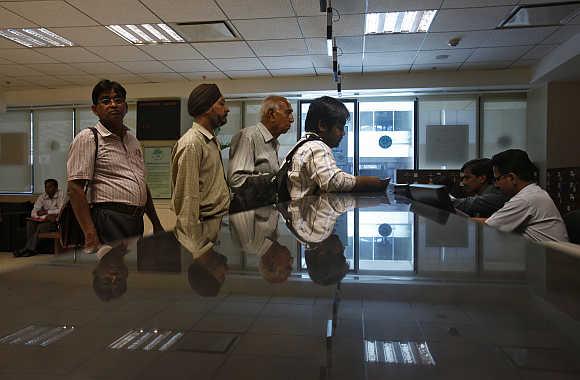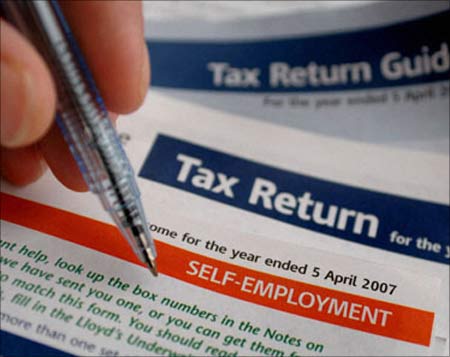This article was first published 11 years ago
Home »
Business » Guard your tax papers, an identity thief can steal them
Guard your tax papers, an identity thief can steal them
Image: People submit their papers inside the Income Tax office in New Delhi.
Photographs: Mansi Thapliyal/Reuters
If criminals intercept just one 16A form -- or if they dupe someone into providing that information -- they gain enough information that can be used for identity theft, notes Mohan Jayaraman.
Identity thefts can happen in numerous ways, ranging from simple to sophisticated techniques.
Phishers can send emails or text messages asking you to update your information by directing you to a false website that remarkably resembles the legitimate site.
Lesser sophisticated techniques include posing as bank representatives, stealing wallets, rummaging through dustbins, etc.
Tax-related identity theft is an ongoing problem.
This is the time of the year when there is abundant personal and financial data circulating in the form of photocopies and over the Internet.
If criminals intercept just one 16A form -- or if they dupe someone into providing that information -- they gain enough information that can be used for identity theft.
. . .
Image: The threat of identity theft leaves you with more to worry about than whether or not you have filed your return on time.
Photographs: Rediff Archives
Avantika Sharma filed her returns online in the last week of February.
She received a notification that two tax refunds were filed under her name.
After making enquiries, she found that her Permanent Account Number card number was stolen in a data breach and all her personal data was used to file a false tax return.
Sharma’s case is not an isolated incident.
The threat of identity theft leaves you with more to worry about than whether or not you have filed your return on time.
While the thought of someone messing with your personal information is unsettling enough, most people are not aware that a thief may use sensitive information, such as a PAN number, to claim a fraudulent tax refund, open fraudulent credit cards/loans or commit other criminal acts.
Following a few simple steps can go a long way to help safeguard your identity during tax time.
. . .
- Keep a regular tab on your form 26AS as this is a consolidated record of all the tax payments and receipts. Any irregular change in the same not tallying with expected tax deductions or receipts needs to be noted. If there is a suspicion of identity theft the same needs to be reported to the income tax department immediately.
- Place tax documents in a secure location, such as a safe or a locking file cabinet, and store them there until needed to prepare tax forms. Do not leave them in a car or other easily accessible places.
- Use a secure delivery method to deliver your documents. Avoid using a public wi-fi network to e-file taxes. Public wi-fi networks are especially vulnerable as these are not secured or encrypted networks and sophisticated fraudsters can always infiltrate the same without difficulty.
. . .
Photographs: Uttam Ghosh/Rediff.com
- Some tax apps require users to take photos of form 16A. Be sure to delete images after use and password-protect your smartphone at all times.
- Do not follow links in emails or text messages that falsely claim to be from the income tax department. Always type ‘incometaxindia. gov.in’ directly into a browser to avoid spurious links.
- Keep operating systems and all computer protection software up to date to avoid phishing. Remember to wipe your hard drive clean before disposing your old computer/laptop.
- Don’t leave photocopies of your PAN lying around. It is not only the actual PAN card that can be used for identity theft but also photocopies which are typically submitted while opening bank accounts, obtaining a new credit card etc.
. . .
Image: A fraudster can eventually use tax-related information such as the PAN number in opening bank accounts or getting a line of credit.
Photographs: Uttam Ghosh/Rediff.com
- Provide PAN details to authorised people and only when needed
- Don’t give personal information over the phone, through the mail or on the Internet unless you have initiated the contact or you are sure you know who you are dealing with.
- A fraudster can eventually use tax-related information such as the PAN number in opening bank accounts or getting a line of credit. A very valuable instrument that can be used to detect any such event is your Credit Information Report. This report can be obtained from any established credit bureau.
. . .
Image: Any major, unexpected changes in your credit scores could signal identity theft.
Photographs: Uttam Ghosh/Rediff.com
Key points to look for in your credit report are:
- Credit cards and other loan accounts and compare it with known liabilities.
- Past enquiries section of the credit report which indicates if someone is attempting to obtain new loans using your identity.
- Verify if the PAN and other details quoted in the report against each loan account are accurate. Inaccuracies in the same especially against an unknown loan account can be indicative of fraud.
- Any major, unexpected changes in your scores could signal identity theft. If you know your personal information has been compromised, you can report it immediately, thus averting identity fraud. Using this tool judiciously can save you time and money in the long run.
The author is Managing Director, Experian Credit Information Company of India and Country Manager, Experian India
. . .
Photographs: Uttam Ghosh/Rediff.com
Finance ministry warns of risk to online I-T accounts
While identity theft of any kind is worrisome, it is even more so in the light of the finance ministry admitting that some online I-T accounts had been accessed by unauthorised persons.
In a warning issued last week, the ministry said that details of some taxpayers who had filed returns online had been obtained by outsiders (not from the I-T department), the passwords reset and accounts accessed.
The ministry is looking into it and taking measures to prevent it.
Now it is mandatory for those with incomes of Rs 10 lakh (Rs 1 million) and above to file I-T returns online.
This has definitely made life easier.
We can file returns sitting in the comforts of our houses or offices.
No longer do we have to wait in the long queues to submit the returns.
Even if we are late the returns at the last minute (which is the case with many of us) we can do it very easily.
But with identity theft a real threat, tax-payers must exercise caution while doing so.
. . .
Source:







